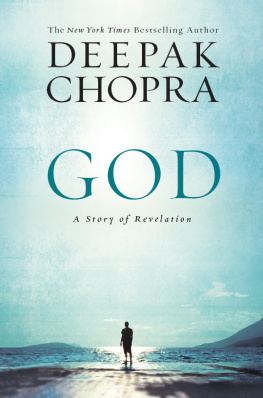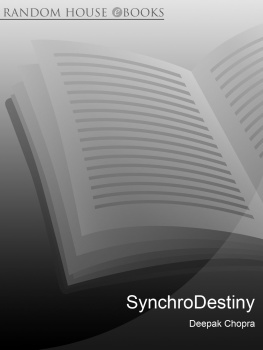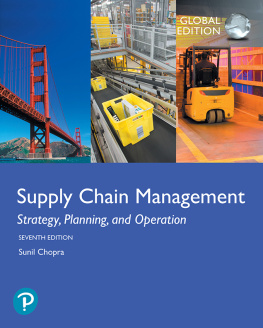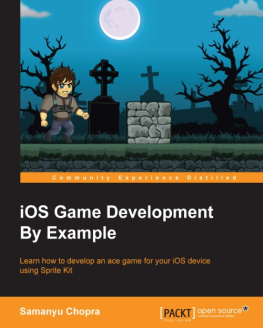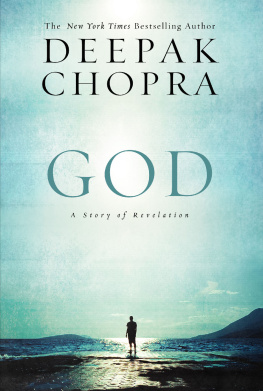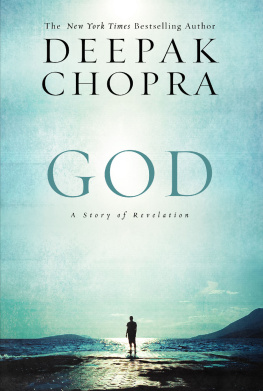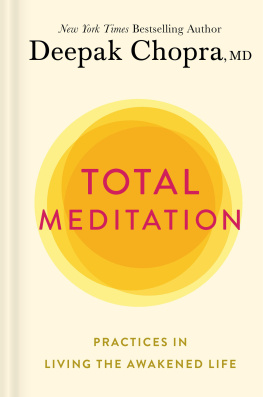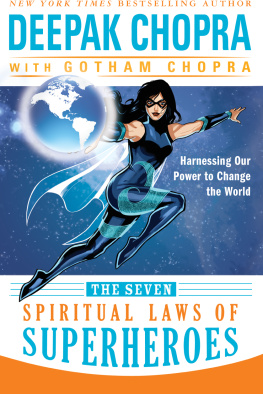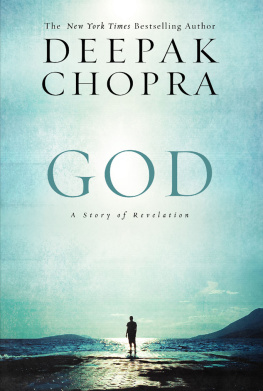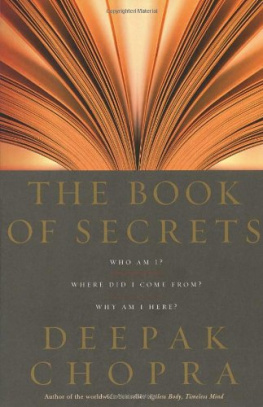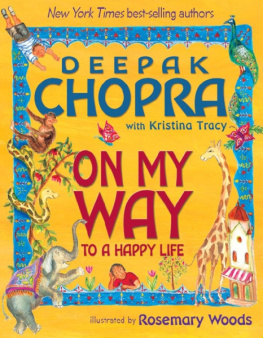
GOD
A Story of Revelation
Deepak Chopra

Contents
Like a car with two steering wheels, the world has been guided by two forces, the spiritual and the secular, that fight for control. The secular has seized the advantage today, but for many centuries the power lay with spirituality. Visionaries could shape the future as much as kings, often more. A king was anointed by God, but visionaries were visited by God. They heard his message personally before appearing in public to announce what God wanted people to do.
I became fascinated by the perplexing situation that visionaries find themselves thrust into. Very few asked for this power to affect other people. God wrenched them from the comfort of everyday life and guided their steps. The voice they heard in their heads wasnt their own, but divinely inspired. What was that like? On one hand, it must have been terrifying. In a world that made a spectacle of feeding martyrs to lions, crucifying saints as enemies of the state, and jealously guarding old religions, the voice of God could be pronouncing a death sentence. On the other hand, to experience the divine was ecstatic, as witnessed by the mystical poets in every culture who had a love affair with the divine. That mixture of rapture and torment became the seed of this book.
God is an empty term except as it finds expression through the revelations of all the saints, prophets, and mystics of history. They exist to plant the seeds of spirituality as direct experience rather than a matter of hope and faith. Yet no one can say that God was revealed in one consistent shape delivering one consistent messagequite the opposite. Somehow revelations can be divine and contradictory at the same time.
Why doesnt God just say whats on his (or her) mind and let it spread to every people? The contradiction in holy messages arose because of our own limitations. Lets assume that God is infinite. Our minds are not equipped to perceive the infinite. We perceive what we are prepared to see and know. Infinity reveals itself in bits and pieces tailored to each society, epoch, and habit of mind. We label as God mere glimpses of higher reality, like seeing one figure in Da Vincis Last Supper . A glimpse fills us with wonder, but the whole thing has been missed.
With that in mind, Ive turned this novel into a meditation about God in us. Only half is fictional, devoted to ten visionaries entranced by the words that God spoke to them. The other half consists of reflections on what God meant when he singled out these sages, seers, prophets, and poets. The message wasnt the same each timeJob in the Old Testament heard something very different from what St. Paul in the New Testament heardyet one sees a pattern.
God evolves. Thats why he keeps speaking and never grows silent. The very basic fact that God has shifted between he, she, it, and none of the above shows how changeable the divine presence is. But to say that God evolves implies that he began in an immature state and then grew into fullness, when every faith holds that God is infinite to begin with. What actually evolved was human understanding. For thousands of years, perhaps as far back as cave dwellers, the human mind held a capacity for higher reality. Sacred paintings and statues are as ancient as civilization, preceding written language and probably even agriculture.
Nearness to God is a constant, not just in human history, but in human nature. If we are connected to our souls, the connection is permanent, even if our attention falters. We think that God changes, because our own perception waxes and wanes. The messages keep coming, though, and God keeps showing different faces. Sometimes the whole notion of the divine gets hidden, when secular forces snatch the steering wheel and attempt to drive alone. But the force of spirituality never fully surrenders. God stands for our need to know ourselves, and as awareness evolves, so does God. This journey never ends. At this moment somewhere in the world a person is waking up in the middle of the night hearing a message that feels uncanny, as if arriving from another reality. Actually, there must be many such visitations every night, and the people who step forth to announce what theyve heard form a motley crew of crazies, artists, avatars, rebels, and saints.
Ive always wanted to join this motley crew, and in the following pages I get to imagine that I belong with them. Dont we all, at some level, want to join the outsiders? Their stories tear at our hearts and uplift our souls. The lessons they learned took the human race down unknown roads. One could do worse than to jump the track of everyday life and follow them.
Deepak Chopra
April 2012
Where does the world end? the father asked.
His son, Job, wasnt prepared for being questioned. It was spring. Outside their tent the first warm breezes carried the pleasant noise of birds and frisky lambs. The boys friends were kicking a leather ball across the fields.
I asked you a question.
Job pulled at his sandal straps and stared at the carpeted dirt floor. The world ends at the city walls, where the demons are locked out.
This seemed reasonable to a ten-year-old. He had been warned about demons very early, and their names, such as Moloch and Astaroth, stuck in his mind. Claws and fangs held a dread fascination. When the winter cold drove the shepherds back inside the city gates, Job felt trapped, but he was forbidden to venture where he might inhale a demon as easily as a gnat.
His father shook his head. Try again. Where does the world end?
A big man, Jobs father loomed over him; he wore a menacing look, which was out of place in a weaver who was almost as easy with his children as a woman. This time, though, Job knew without thinking that the look was dangerous.
The world ends where Judea meets the land of war, he replied. This had to be right. Their green valley, known as Uz, petered out into the brown scorching desert, like milk spilled from a jug that flows until the sand drinks it up. The difference was that the land of war drank blood.
But his father still loomed. One last time, boy. Where does the world end?
Now the boy was tongue-tied with bewilderment. He lowered his eyes. Suddenly, he was struck a hard blow on the side of his head, hard enough to hurl him flat on the ground, where he lay, very still. When he stopped seeing stars, Job stared at his father, who was bending over him, examining him the way you examine a wounded goat for maggots.
The world ends here, his father grunted. He suspended his brawny arm over Jobs face. Dont ever forget my fist.
Why was he acting this way? There was no chance that the boy would cry. The blow was unfair. A pride known to small children rose in him. He had been insulted, and insults deserve contempt, not tears. But his fathers fist remained clenched, and Job wouldnt risk a second blow. He bit his lip and wore a mask until his father, having made the point, straightened up and strode out of the tent without another word.
He had dropped something and left it behind. A scrap of cloth, fine white wool with a purple stripe in it. Job only just noticed it when his mother came rushing in, wringing her hands, which were wet from the washtub. There was no time to tell her what had happened. There wasnt time for a word, in fact, before her face crumpled and she let out a shriek. She grabbed up the scrap of cloth and pressed it to her cheek.
Job was stunned. His mother was a dignified woman, the kind who turned away rather than be watched suckling a baby. Job had never seen her anything but fully dressed. Suddenly she tore at her black shift and almost ripped it away from her breast. It took a moment before her strangled sobs formed into a word the boy could understand.
Next page
